|
|
|
Sort Order |
|
|
|
Items / Page
|
|
|
|
|
|
|
| Srl | Item |
| 1 |
ID:
089818
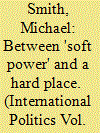

|
|
|
|
|
| Publication |
2009.
|
| Summary/Abstract |
This paper explores the pressures operating on European Union Foreign and Security Policy in the 'triangle of forces' created by the European integration process, developments in the Islamic world and the responses of the United States. In the first section, the paper explores ideas about foreign policy and power in the European Union (EU), as exemplified in debates about the Lisbon Treaty and the future role of the Union. The second part of the paper sets out three logics inherent in the development of the Common Foreign and Security Policy, distinguishing between the 'internal' logic of the European integration process, the 'external' logic reflecting the opportunity structure in the world arena, which creates challenges and opportunities for the EU and its Member States, and the 'identity' logic, which creates a move towards self-realisation and 'self-recognition' on the part of the EU in international politics, and relates this to recent developments in European foreign and security policy. The paper then argues that the multi-dimensional 'triangle of forces' between European integration, the Islamic world and the United States has played a key role in focusing these developments, by posing challenges to the three logics and creating complex linkages between them. The Conclusion asks whether as a result EU foreign policy has been 'catalysed' (given new impetus and direction) or 'constrained' (subject to a process of external or self-limitation), and points to some early indications of the impact of the Obama Administration in the United States.
|
|
|
|
|
|
|
|
|
|
|
|
|
|
|
|
| 2 |
ID:
089821
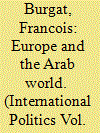

|
|
|
|
|
| Publication |
2009.
|
| Summary/Abstract |
Can the European Union (EU) secure the confidence of the Middle Eastern masses while being perceived as the ally and accomplice of two main adversaries of the Arab population, namely the Israeli state and the authoritarian Arab regimes, which are rightly accused to be violating international law and the same principles of good governance that the EU is purportedly promoting in the Middle East? Europe's inaccurate identification of suitable partners, within Arab civil society or opposition movements, and, most notably, its chronic inability in establishing meaningful relations with the emerging generation of moderate Islamic actors, has impacted negatively upon the EU's image in the Middle East, diminishing significantly the effectiveness of its regional policies.
|
|
|
|
|
|
|
|
|
|
|
|
|
|
|
|
| 3 |
ID:
089810
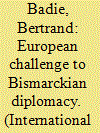

|
|
|
|
|
| Publication |
2009.
|
| Summary/Abstract |
The Middle East crisis is strongly challenging the principles of classical diplomacy, which this paper has identified as a 'Bismarckian diplomacy'. The Palestinian, Iraqi and Afghan conflicts are bearing upon international relations, in a way that highlights the inefficiencies of a diplomatic orientation centred on power and military force. These transformations shed lights on the roots of Bismarckian diplomacy and its main components; they make clear its Weberian affinities and the controversial distinction between a Weberian approach to International Relations and its 'Durkheimian challenge'. This paper will delineate the main features of this new 'Durkheimian diplomacy', its social orientation, and the emphasis it confers on the social dimension of conflicts in the Middle East.
|
|
|
|
|
|
|
|
|
|
|
|
|
|
|
|
| 4 |
ID:
089813


|
|
|
|
|
| Publication |
2009.
|
| Summary/Abstract |
Islamic exceptionalism (IE), or the discourse of Islam's inassimilable difference, legitimizes post-9/11 encounters with Islam and strategies of political and cultural domestication of the Islamic cultural zones (ICZs). It may also furnish new grounds for exclusions, enclosures and securitization. The aim of this paper is to explore the principal vectors of the field of vision generated by IE; to draw out any possible connections between IE and a presumed global exception (GE); and more broadly, to delineate how IE speaks to the perils of International Relations (IR)'s occlusion of the political in ICZs. In exploring the nexus between IE and GE, both the recursive character of GE and its constraints are noted, with an appreciation of cultural mappings nourishing GE. The key implication drawn is the need to avoid the temptation of an abstract notion of GE without ample recognition of its particularized instantiations, notably in reference to Islam.
|
|
|
|
|
|
|
|
|
|
|
|
|
|
|
|
| 5 |
ID:
089814


|
|
|
|
|
| Publication |
2009.
|
| Summary/Abstract |
This paper focuses on analysing NATO's involvement in Afghanistan, a current issue in the interaction between two main constituents of the West, the United States and Europe, with a part of the Muslim world. NATO forces in Afghanistan are engaged in one of the severest battles in the organisation's history. A failure in Afghanistan will have great implications for the transatlantic relationship as well as for the relations between the Muslim world and the West. The Alliance has been able to successfully deal with numerous challenges in the past. Would it be able to overcome the latest challenge? The aim of this paper is to examine this question. The paper starts with analysing the dynamics through which NATO reinvented itself in the 1990s, and then focuses on the post-9/11 era and the deployment of NATO forces in Afghanistan. The challenges posed by the resurgence of the Taliban insurgency are examined next, followed by a discussion of the internal rifts within NATO in general and regarding Afghanistan in particular. The conclusion assesses the chances of NATO's success and makes some policy recommendations.
|
|
|
|
|
|
|
|
|
|
|
|
|
|
|
|
| 6 |
ID:
089816
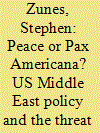

|
|
|
|
|
| Publication |
2009.
|
| Summary/Abstract |
This paper examines US policy in the greater Middle Eastern region in the aftermath of the September 2001 al-Qaida attacks on the United States. The paper argues that the US Administration had engaged in a series of policy initiatives which have posed a direct challenge to the post-World War II international legal order. The doctrine of preventative war, the invasion and occupation of Iraq, threats against Iran, the aggressive counter-insurgency operations and air campaigns in Afghanistan, the backing for some of the more militaristic and expansionist elements in Israel, and related policies have served to alienate the United States from Middle Eastern states and even traditional European and Asian allies whose cooperation is needed in the struggle against international terrorism. The overemphasis on military means to address complex political, social and economic problems in Iraq, Lebanon and Iran has emboldened extremists and weakened moderate voices and have resulted in a more anarchic international order which makes legitimate counter-terrorism efforts all the more difficult.
|
|
|
|
|
|
|
|
|
|
|
|
|
|
|
|
| 7 |
ID:
089822
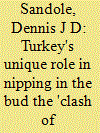

|
|
|
|
|
| Publication |
2009.
|
| Summary/Abstract |
This paper focuses on Turkey, a Muslim (but secular) country located culturally and geographically in, and between, Europe, the Middle East and Asia. It has a well-embedded Jewish community, enjoys a strong positive relationship with the State of Israel and is a long-term member of North Atlantic Treaty Organization. Turkey has also been negotiating entry into the European Union, the pre-eminent example of the Kantian system of 'perpetual peace.' The paper addresses these and other aspects of Turkey's complex identity, exploring their implications for 'civilizational' peace, security and stability regionally and worldwide. The paper contributes, therefore, to the discussion on the complex relationship between Islam and the West by framing Turkey as uniquely well positioned to undermine and perhaps even reverse self-fulfilling, post-9/11 trajectories toward a full-blown 'clash of civilizations.'
|
|
|
|
|
|
|
|
|
|
|
|
|
|
|
|
|
|
|
|
|